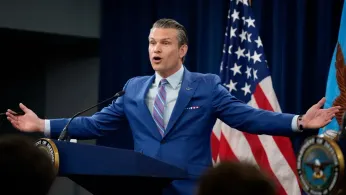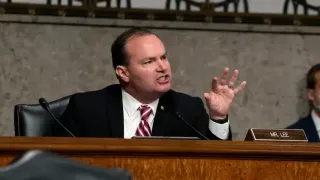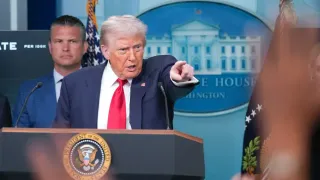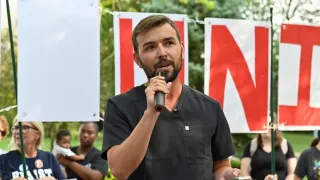
4 hours ago
Pete Hegseth Sraws Backlash After Sharing Video of Pastor Calling to Criminalize Gay Sex
READ TIME: 3 MIN.
Fox News personality and former cable host Pete Hegseth is under fire after sharing a video featuring pastors calling to “ban gay sex,” a stance that advocates say seeks to revive discredited “sodomy laws” once used to criminalize consensual intimacy between adults. The video, linked to pastors associated with Hegseth’s church community, also advocated for ending women’s suffrage, prompting a swift backlash from LGBTQ+ organizations, civil rights advocates, and legal scholars. .
The Associated Press, in a report carried by ABC News, documented that Hegseth reposted the video on social media, where pastors promoted Christian nationalist ideas including criminalizing same-sex intimacy and rolling back women’s voting rights. The post drew a polarized response, with some users endorsing the message and many others expressing alarm that a prominent conservative figure would amplify calls to curtail fundamental rights. .
LGBTQ+ media outlet The Advocate reported that the video involved pastors connected to the Communion of Reformed Evangelical Churches (CREC) emphasizing an agenda that includes re-criminalizing gay sex, while reinforcing patriarchal norms in civil society. The outlet noted that Hegseth shared the clip with a caption interpreted by critics as approving the pastors’ message. .
Coverage in The Economic Times indicated that Hegseth faced immediate condemnation after reposting the video and highlighted the online response to the message advocating for women to “submit” and for the end of women’s voting rights. The report described multiple users’ criticisms of the repost and the implications of endorsing such proposals in the contemporary political climate. .
Advocates point out that attempts to criminalize same-sex intimacy are at odds with the United States Supreme Court’s landmark 2003 decision in Lawrence v. Texas, which invalidated sodomy laws nationwide and affirmed the right of consenting adults to private sexual conduct. Legal experts stress that any push to restore criminal bans on gay sex would conflict with this precedent, and that calls to remove women’s voting rights are barred by the Nineteenth Amendment. .
The AP’s reporting noted that reactions to Hegseth’s repost ranged from support among some adherents to Christian nationalist ideology to warnings from civil liberties advocates that such rhetoric contributes to a climate of hostility against LGBTQ+ people and women. The public controversy underscores broader fights over religiously inflected political advocacy and the boundaries of free expression when it targets protected classes. .
While Hegseth’s exact intent in sharing the video was not detailed in his post, coverage by The Advocate observed that he appeared to endorse the pastors’ views by promoting the clip without caveats, further inflaming concerns that high-profile media figures are normalizing fringe proposals. The report emphasized the explicit nature of the calls—criminalizing gay sex and eliminating women’s suffrage—drawing attention from LGBTQ+ and feminist communities who view the message as an attack on fundamental dignity and rights. .
The incident arrives amid escalating rhetoric targeting LGBTQ+ people, including legislative pushes in several states to restrict LGBTQ+ inclusive education, limit gender-affirming care for transgender people, and curtail nondiscrimination protections. Advocates say proposals to re-criminalize same-sex intimacy represent an extreme extension of these broader campaigns and a direct challenge to the privacy and equality principles undergirding modern LGBTQ+ civil rights. .
Organizations focused on LGBTQ+ rights have urged public figures and media outlets to reject rhetoric that seeks to criminalize identities or intimate conduct, noting that such messages can fuel stigma and harassment. Legal scholars further emphasize that the Supreme Court’s privacy jurisprudence—extending from cases like Lawrence—has formed a core pillar of LGBTQ+ protections, even as ongoing debates over substantive due process have intensified following the Court’s recent term in other civil rights contexts.






